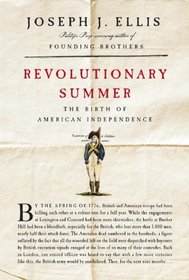Leo T. reviewed Revolutionary Summer: The Birth of American Independence on + 1775 more book reviews
This is the product of Dr. Ellis' lifetime of study of the Revolution and the Federal Era. He urges readers to consider how these times appeared to contemporaries when there were sovereign states, not a United States, and who, unlike us, did not know the outcome. The late 18th C. concept of honor was important.
Professor Ellis argues that both the states finding their way politically and the rebel army succeeding in remaining in the field during five months in 1776 was the key to eventually prevailing against the overwhelming power of the United Kingdom. "Knowing the outcome of the American Revolution has also blinded us to the problematic character of this intense moment, when everything was in the balance, history was happening in an accelerating pace, and both sides--especially the Americans--were improvising on the edge of catastrophe."
Nathaniel Greene, a private in 1775 and a general in 1776, is praised for convincing Washington to accept that standing and fighting for New York was much less important than making a strategic withdrawal to preserve the army in the field. "In Greene's calculus, the survival of the Continental Army counted more than the defense of any piece of ground."
The last chapter considers the postwar defense of Admiral Howe and General Howe against talk that they had lost the colonies by using a measured step by step pace to put down the rebellion. Readers will recall the question 'Who lost China?' in the 20th C.
The British ruling class blamed the loss on the failure to promptly bring the rebels to a battlefield. "The beauty of this interpretation was that it sidestepped the question of whether the policies of the British ministry that had caused the war were sensible, which they clearly were not, and it located the source of the British failure in one discreet moment, the summer of 1776, and one British officer, William Howe, who missed the chance to destroy the Continental Army. This meant that fundamental questions about core assumptions underlying Britain's imperial agenda need not be raised."
Plates, maps, endnotes, index.
Professor Ellis argues that both the states finding their way politically and the rebel army succeeding in remaining in the field during five months in 1776 was the key to eventually prevailing against the overwhelming power of the United Kingdom. "Knowing the outcome of the American Revolution has also blinded us to the problematic character of this intense moment, when everything was in the balance, history was happening in an accelerating pace, and both sides--especially the Americans--were improvising on the edge of catastrophe."
Nathaniel Greene, a private in 1775 and a general in 1776, is praised for convincing Washington to accept that standing and fighting for New York was much less important than making a strategic withdrawal to preserve the army in the field. "In Greene's calculus, the survival of the Continental Army counted more than the defense of any piece of ground."
The last chapter considers the postwar defense of Admiral Howe and General Howe against talk that they had lost the colonies by using a measured step by step pace to put down the rebellion. Readers will recall the question 'Who lost China?' in the 20th C.
The British ruling class blamed the loss on the failure to promptly bring the rebels to a battlefield. "The beauty of this interpretation was that it sidestepped the question of whether the policies of the British ministry that had caused the war were sensible, which they clearly were not, and it located the source of the British failure in one discreet moment, the summer of 1776, and one British officer, William Howe, who missed the chance to destroy the Continental Army. This meant that fundamental questions about core assumptions underlying Britain's imperial agenda need not be raised."
Plates, maps, endnotes, index.




